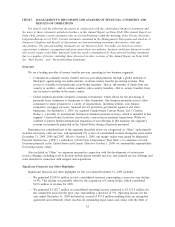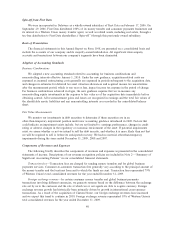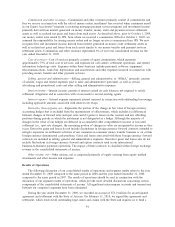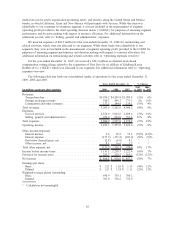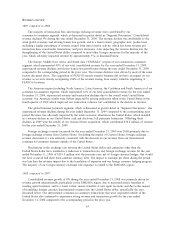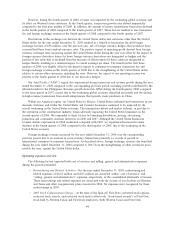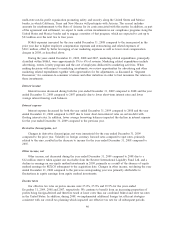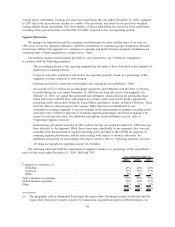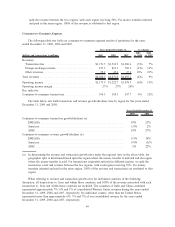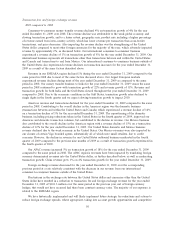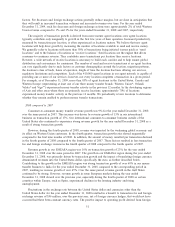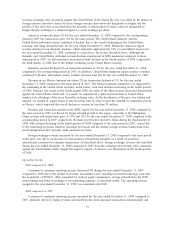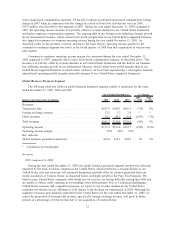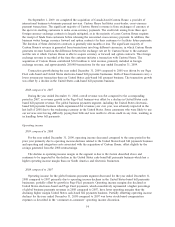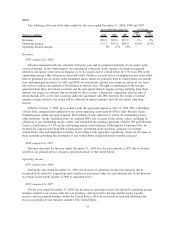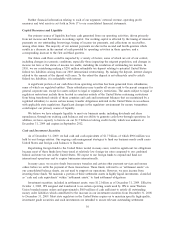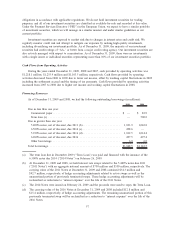Western Union 2009 Annual Report Download - page 61
Download and view the complete annual report
Please find page 61 of the 2009 Western Union annual report below. You can navigate through the pages in the report by either clicking on the pages listed below, or by using the keyword search tool below to find specific information within the annual report.Recent proposed changes to United States tax laws, if enacted, could potentially adversely affect our future
effective tax rate. We are closely monitoring the proposed changes, and the potential effect on our future
effective tax rate will depend on the final form of any new law.
We have established contingency reserves for material, known tax exposures, including potential tax audit
adjustments with respect to our international operations restructured in 2003, whereby our income from certain
foreign-to-foreign money transfer transactions has been taxed at relatively low foreign tax rates compared to
our combined federal and state tax rates in the United States. As of December 31, 2009, the total amount of
unrecognized tax benefits is a liability of $522.7 million, including accrued interest and penalties. Our
reserves reflect our judgment as to the resolution of the issues involved if subject to judicial review. While we
believe that our reserves are adequate to cover reasonably expected tax risks, there can be no assurance that, in
all instances, an issue raised by a tax authority will be resolved at a financial cost that does not exceed our
related reserve. With respect to these reserves, our income tax expense would include (i) any changes in tax
reserves arising from material changes during the period in facts and circumstances (i.e. new information)
surrounding a tax issue, and (ii) any difference from our tax position as recorded in the financial statements
and the final resolution of a tax issue during the period. Such resolution could materially increase or decrease
income tax expense in our consolidated financial statements in future periods and could impact our operating
cash flows.
The United States Internal Revenue Service (“IRS”) completed its examination of the United States
federal consolidated income tax returns of First Data for 2003 and 2004, of which we are a part, and issued a
Notice of Deficiency in December 2008. The Notice of Deficiency alleges significant additional taxes, interest
and penalties owed with respect to a variety of adjustments involving us and our subsidiaries, and we generally
have responsibility for taxes associated with these potential Western Union-related adjustments under the tax
allocation agreement with First Data executed at the time of the Spin-off. We agree with a number of the
adjustments in the Notice of Deficiency; however, we do not agree with the Notice of Deficiency regarding
several substantial adjustments representing total alleged additional tax and penalties due of approximately
$114 million. As of December 31, 2009, interest on the alleged amounts due for unagreed adjustments would
be approximately $30 million. A substantial part of the alleged amounts due for these unagreed adjustments
relates to our international restructuring, which took effect in the fourth quarter 2003, and, accordingly, the
alleged amounts due related to such restructuring largely are attributable to 2004. On March 20, 2009, we
filed a petition in the United States Tax Court contesting those adjustments with which we do not agree. We
believe our overall reserves are adequate, including those associated with adjustments alleged in the Notice of
Deficiency. If the IRS’ position in the Notice of Deficiency is sustained, our tax provision related to 2003 and
later years would materially increase, which could materially impact our financial position, results of
operations and cash flows.
Earnings per share
During the years ended December 31, 2009, 2008 and 2007, basic earnings per share were $1.21, $1.26
and $1.13, respectively, and diluted earnings per share were $1.21, $1.24 and $1.11, respectively. Unvested
shares of restricted stock are excluded from basic shares outstanding. Diluted earnings per share reflects the
potential dilution that could occur if outstanding stock options at the presented dates are exercised and shares
of restricted stock have vested. As of December 31, 2009, 2008 and 2007, there were 37.5 million, 8.0 million
and 10.4 million, respectively, of outstanding options to purchase shares of Western Union stock excluded
from the diluted earnings per share calculation under the treasury stock method as their effect was anti-
dilutive. The increase in anti-dilutive shares in 2009 was primarily due to the majority of our outstanding
options having an exercise price higher than our average market price for the year ended December 31, 2009.
Of the 42.8 million, 43.6 million and 59.4 million outstanding options to purchase shares of our common
stock as of December 31, 2009, 2008 and 2007, respectively, approximately 40%, 47% and 58%, respectively,
were held by employees of First Data.
Earnings per share decreased for the year ended December 31, 2009 compared to the corresponding
previous period as a result of the previously described factors impacting net income, offset by lower weighted-
47



